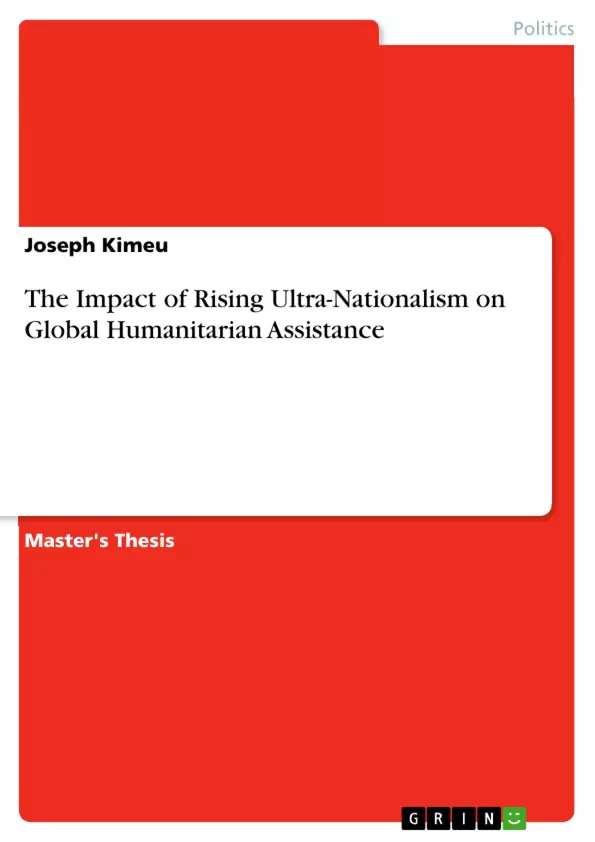This research explores the issues of rising ultra-nationalism in Europe, the influx of immigrants from other parts of the world and how nationalist governments have reacted to this recent humanitarian crisis thus affecting aid initiatives and systems. The research studies the historical, cultural, political, economic and philosophic aspects impacting ultra-nationalism in European society and in so doing, attempts to correlate this with the rising threat of Europe's retreat from and adherence to international humanitarian laws and norms.
The rising phenomenon of European ultra-nationalism has signalled a significant shift in the continent politics, as more right-wing leaders and parties come into power. Many of the ideologies of these radical parties and individuals have often been viewed as discriminatory and exclusionary; more so towards non-European groups, arriving in the continent and fleeing conflict at home.
Inhaltsverzeichnis (Table of Contents)
- Chapter One: General Introduction
- 1.0 Introduction
- 1.1 Background of the Study
- 1.2 Statement of the Problem
- 1.3 Objectives of the Study
- 1.4 Research Questions
- 1.5 Justification and Significance of the Study
- 1.6 Theoretical Framework
- 1.6.1 Liberalism
- 1.6.2 Primordial Theory
- 1.7 Literature Review
- 1.7.1 The Historic Context of Nationalism in Europe
- 1.7.2 Humanitarian Action in Europe
- 1.7.3 Forced Migration and Rising Ultra-nationalism
- 1.8 Research Methodology
- 1.9 Organization of the Thesis
- Chapter Two: Contextualizing the European Union's Role within the Global Humanitarian System
- 2.0 Introduction
- 2.1 The European Union's Impact on Humanitarianism
- 2.2 The Ideological Context of Humanitarian Aid in the European Union
- 2.3 Conclusion
- Chapter Three: The Role of the Right-wing Leadership on Humanitarian Assistance: the Case Study of Austria
- 3.0 Introduction
- 3.1 The Background of Nationalist Politics in Austria
- 3.2 Austria's Humanitarian Aid System
- 3.3 Conclusion
- Chapter Four: The Contemporary Global Humanitarian System
- 4.0 Introduction
- 4.1 The Current Trends and Challenges of the Humanitarian Aid System
- 4.2 Politicization of Humanitarian Assistance
- 4.3 Conclusion
Zielsetzung und Themenschwerpunkte (Objectives and Key Themes)
This thesis aims to analyze the impact of rising ultra-nationalism on global humanitarian assistance, particularly focusing on the European context. The study seeks to understand how the rise of nationalist sentiment is affecting the provision of aid and how it is shaping the political landscape of humanitarian action.- The impact of nationalism on humanitarian aid and its delivery.
- The role of right-wing leadership in shaping humanitarian policy.
- The challenges and trends within the contemporary global humanitarian system.
- The influence of ideological frameworks, such as liberalism and primordial theory, on humanitarian action.
- The impact of forced migration on the rise of ultra-nationalism.
Zusammenfassung der Kapitel (Chapter Summaries)
- Chapter One: General Introduction provides a background to the study, defining the problem, objectives, research questions, and theoretical framework. It also delves into the historical context of nationalism in Europe, humanitarian action in Europe, and the impact of forced migration on the rise of ultra-nationalism.
- Chapter Two: Contextualizing the European Union's Role within the Global Humanitarian System examines the European Union's impact on humanitarianism and explores the ideological context of humanitarian aid within the EU.
- Chapter Three: The Role of the Right-wing Leadership on Humanitarian Assistance: the Case Study of Austria investigates the background of nationalist politics in Austria and analyzes Austria's humanitarian aid system.
- Chapter Four: The Contemporary Global Humanitarian System discusses the current trends and challenges of the humanitarian aid system, including the politicization of humanitarian assistance.
Schlüsselwörter (Keywords)
This study focuses on the interplay between rising ultra-nationalism and the global humanitarian system, examining the impact of nationalism on aid provision and the changing political landscape of humanitarian action. Key terms include: ultra-nationalism, humanitarian assistance, forced migration, European Union, right-wing leadership, ideological frameworks, liberalism, primordial theory, politicization, and the contemporary global humanitarian system.Frequently Asked Questions
How does ultra-nationalism impact global humanitarian aid?
Rising ultra-nationalism often leads to discriminatory policies and a retreat from international humanitarian laws, affecting how aid is distributed and to whom.
What is the relationship between forced migration and nationalism?
The influx of immigrants fleeing conflict has triggered radical right-wing shifts in European politics, as nationalist governments react with exclusionary ideologies.
What role does the European Union play in the humanitarian system?
The EU is a major actor in global humanitarianism, but its ideological context is increasingly challenged by the rise of nationalist member states.
How is Austria used as a case study in this research?
The study analyzes Austria's humanitarian aid system to show how right-wing leadership influences national aid policies and international adherence.
What theoretical frameworks are used to explain these trends?
The research utilizes Liberalism and Primordial Theory to understand the historical and cultural roots of nationalism and its conflict with humanitarian norms.
- Arbeit zitieren
- Joseph Kimeu (Autor:in), 2019, The Impact of Rising Ultra-Nationalism on Global Humanitarian Assistance, München, GRIN Verlag, https://www.grin.com/document/1326047



